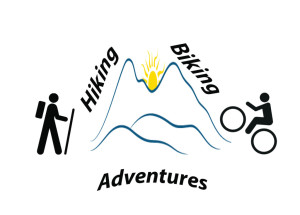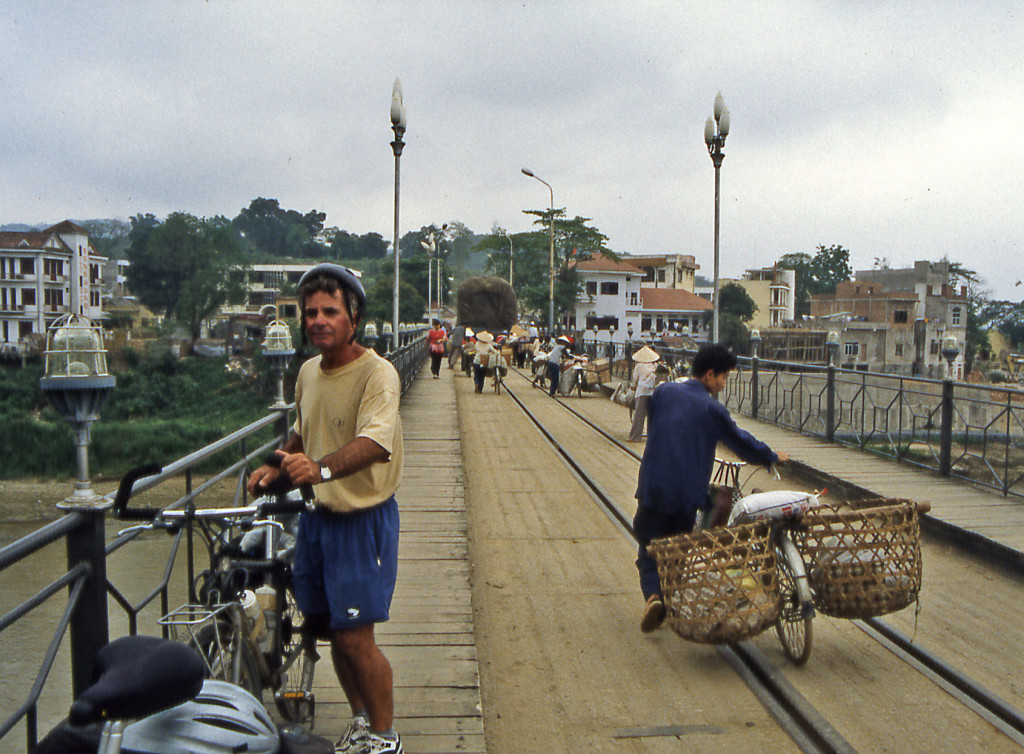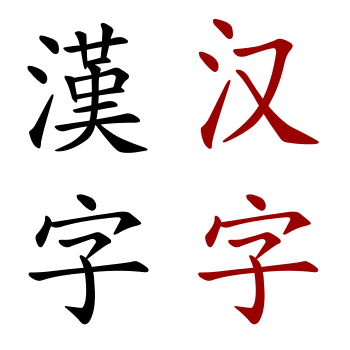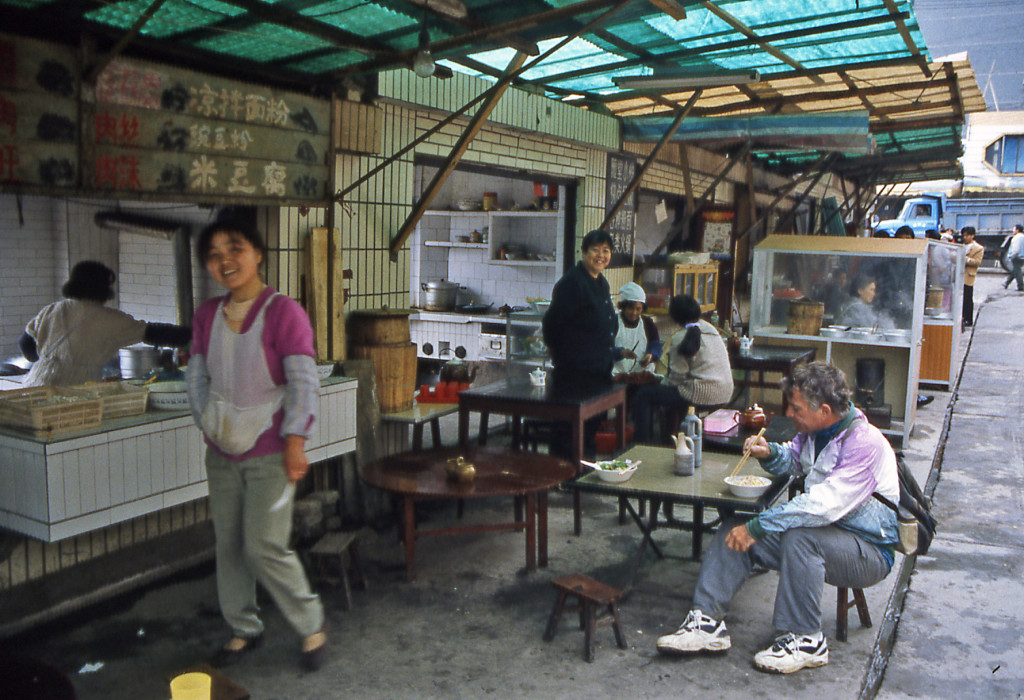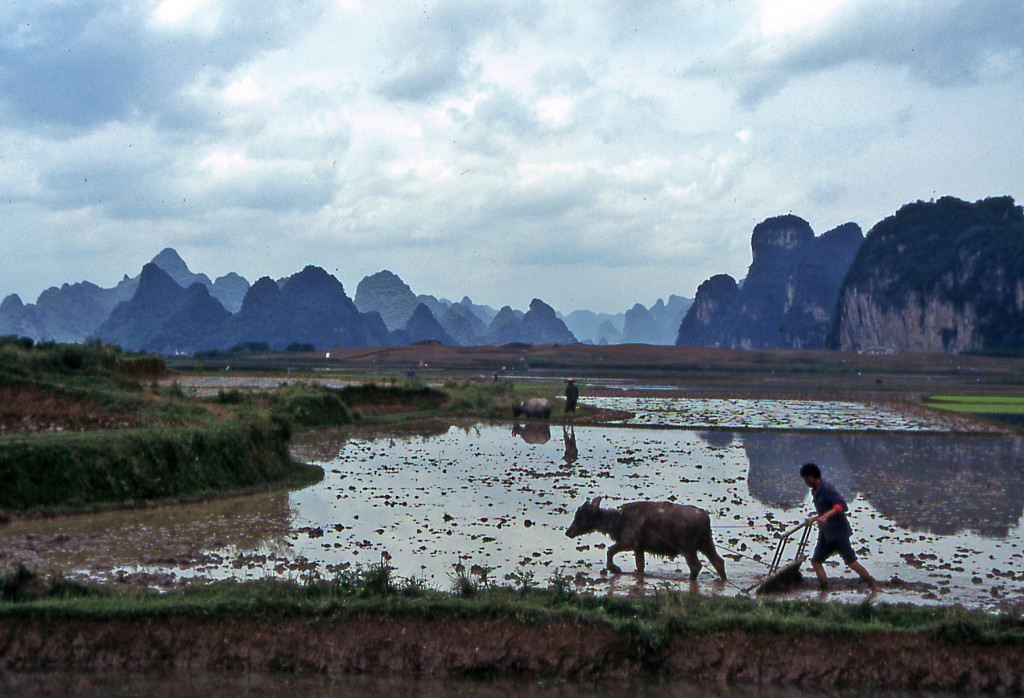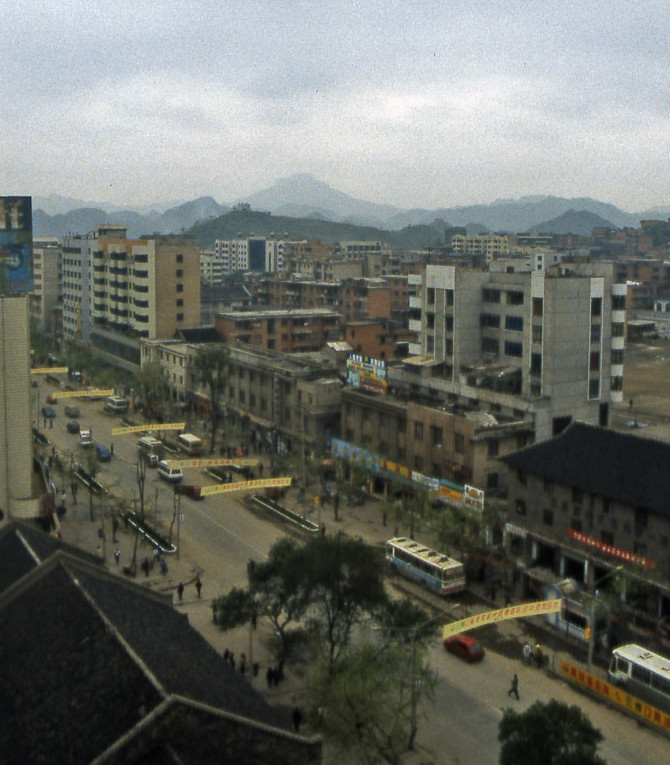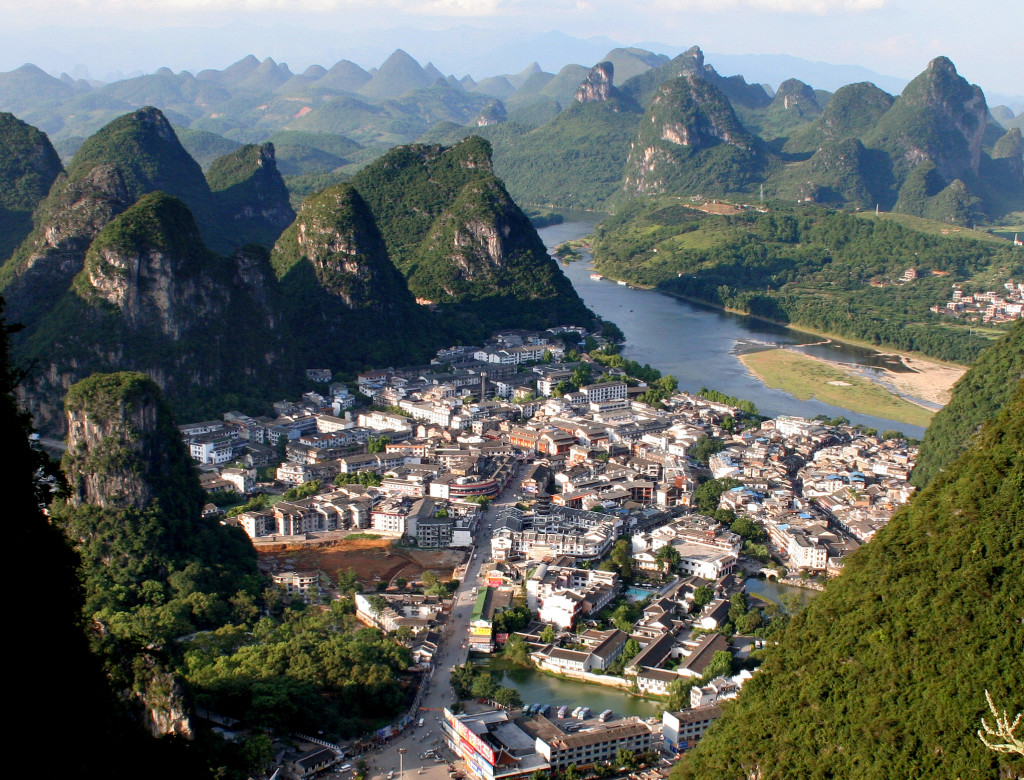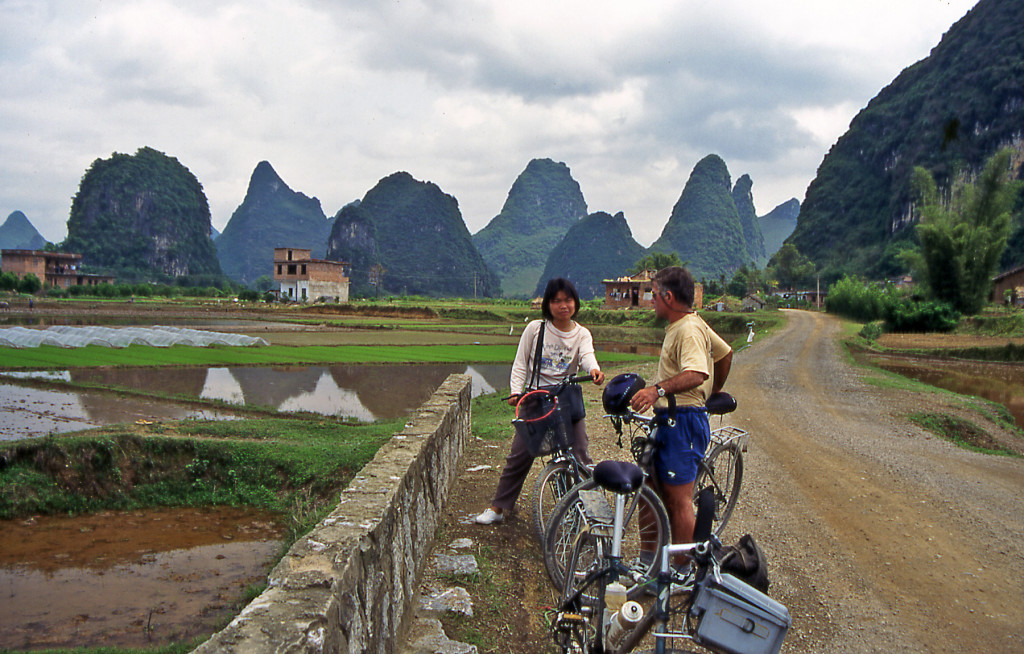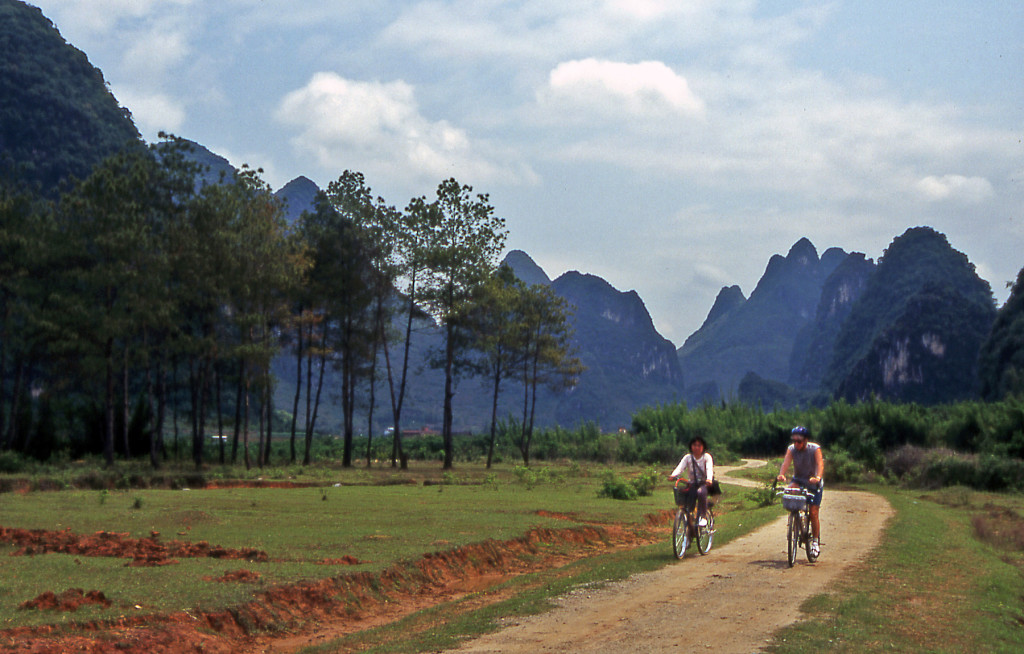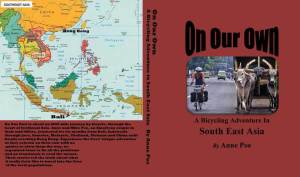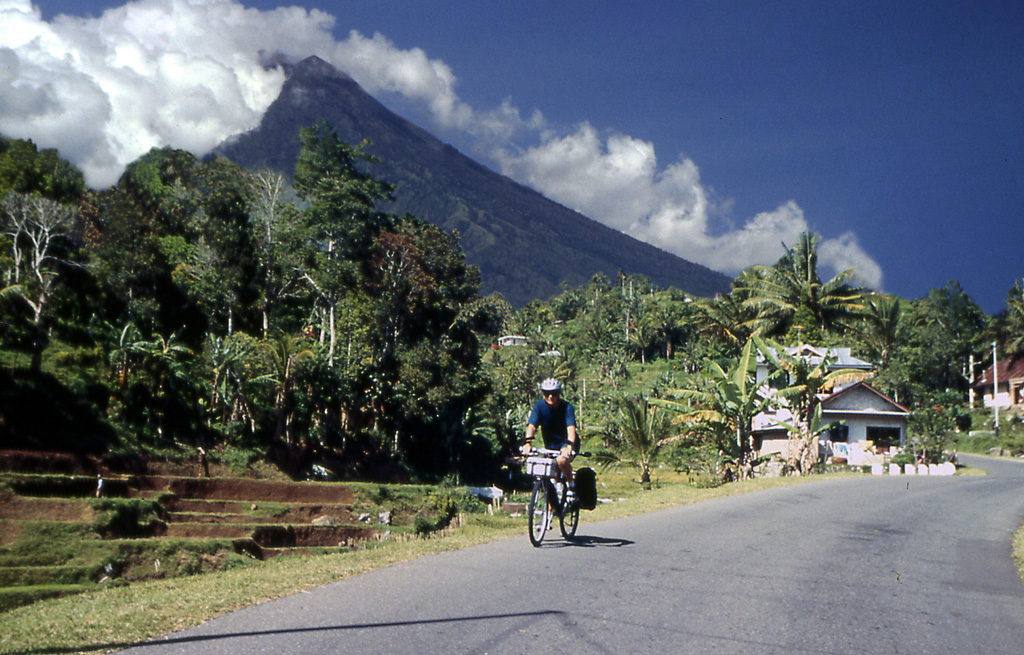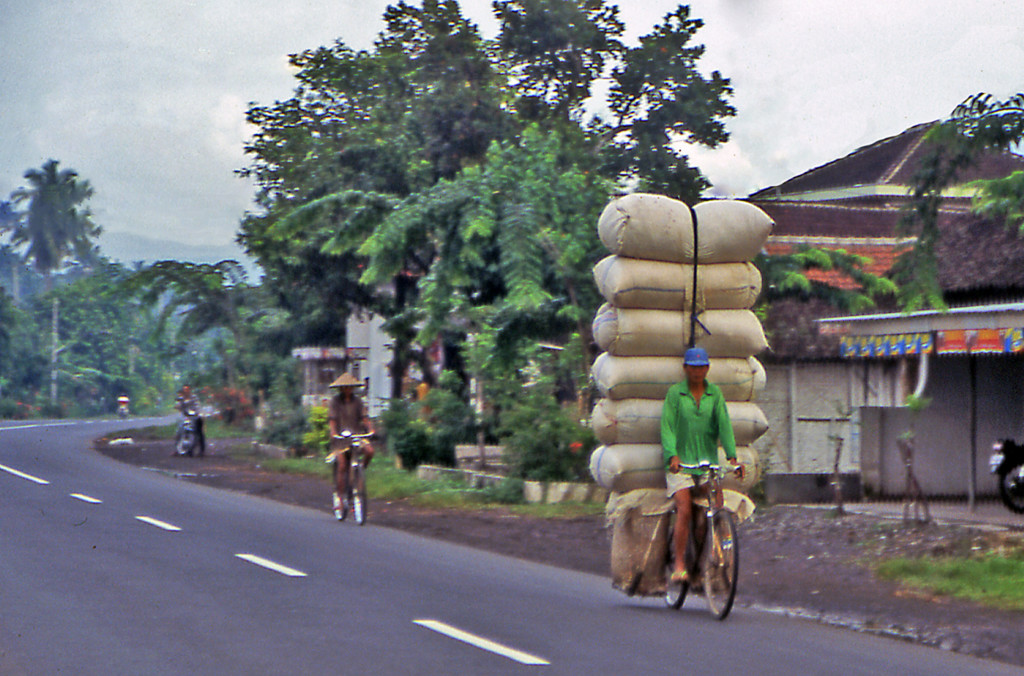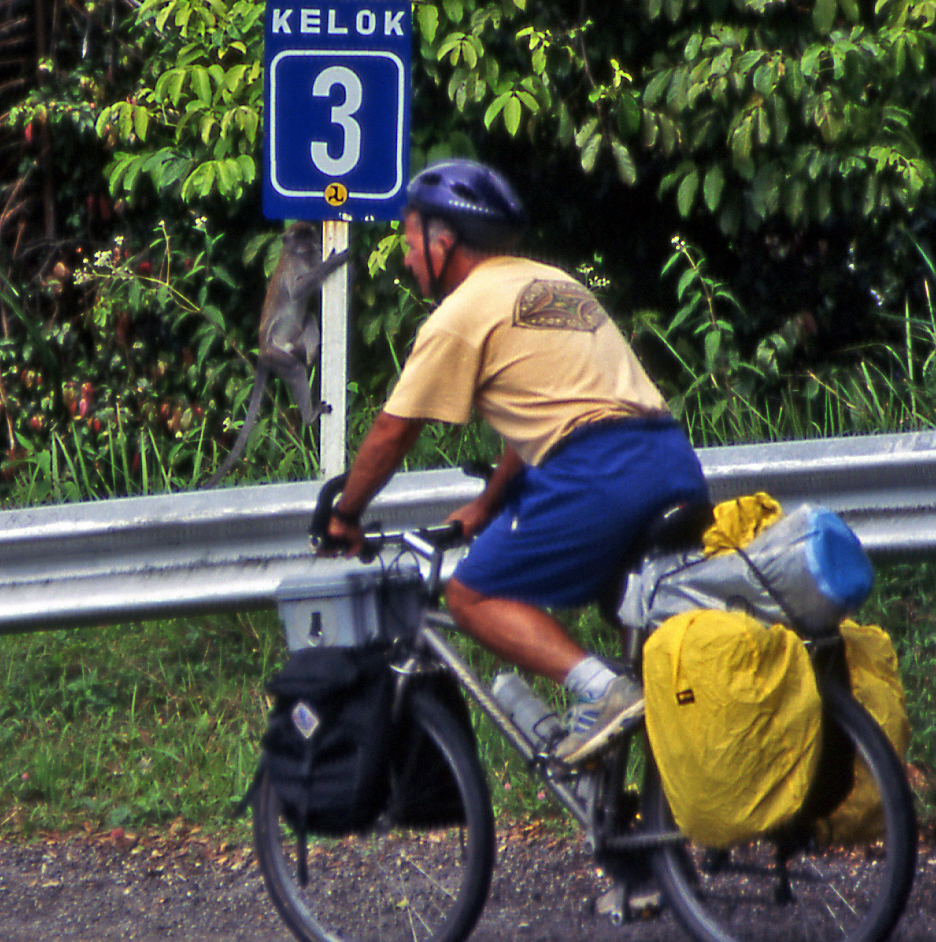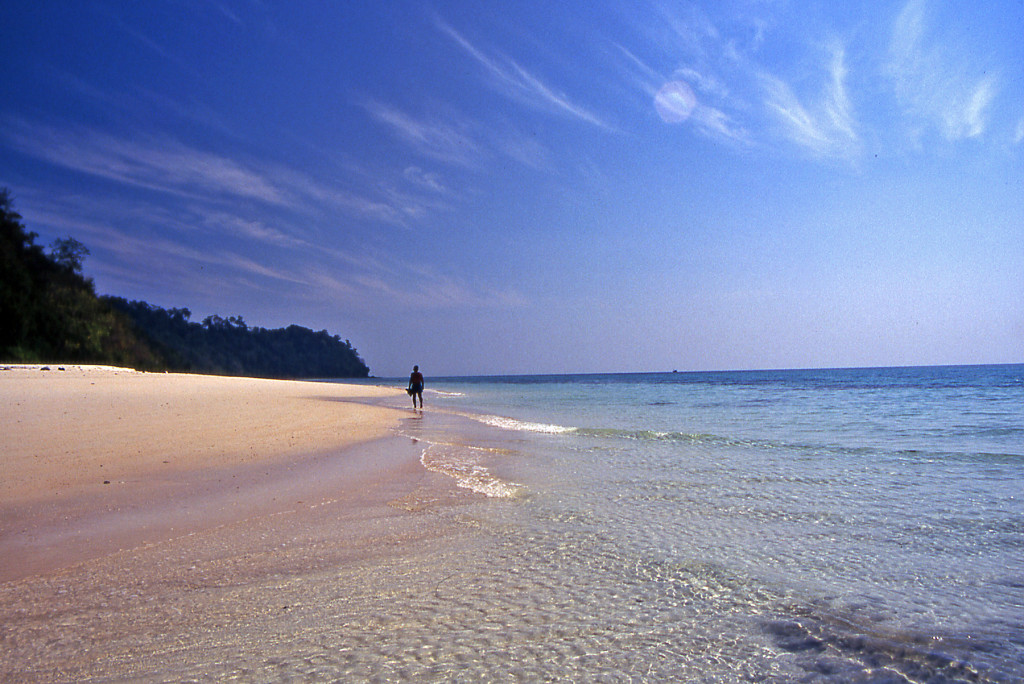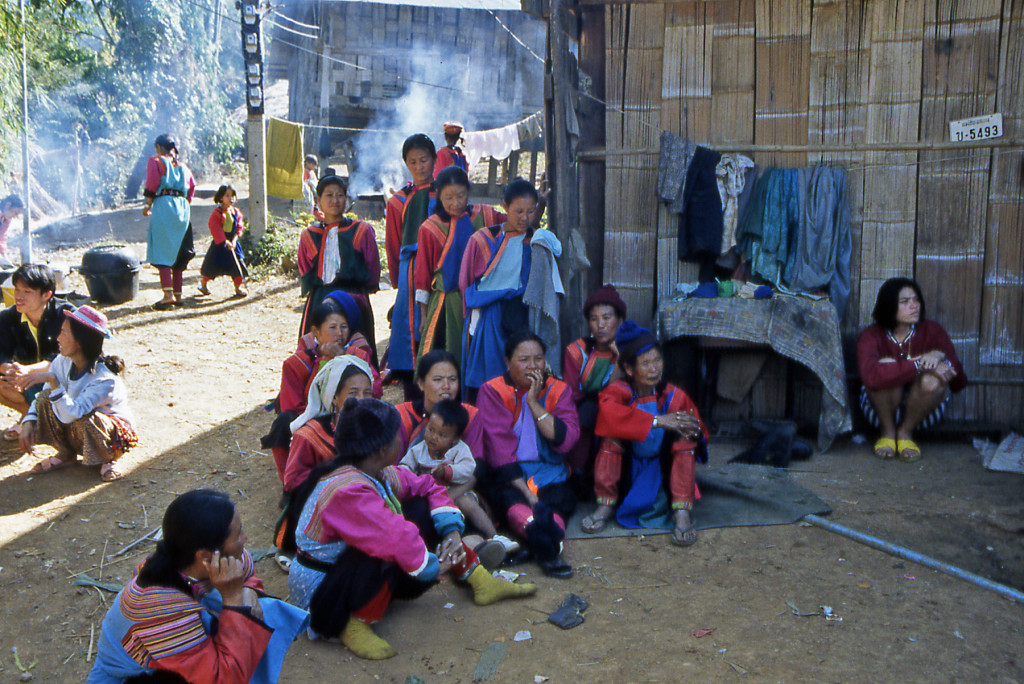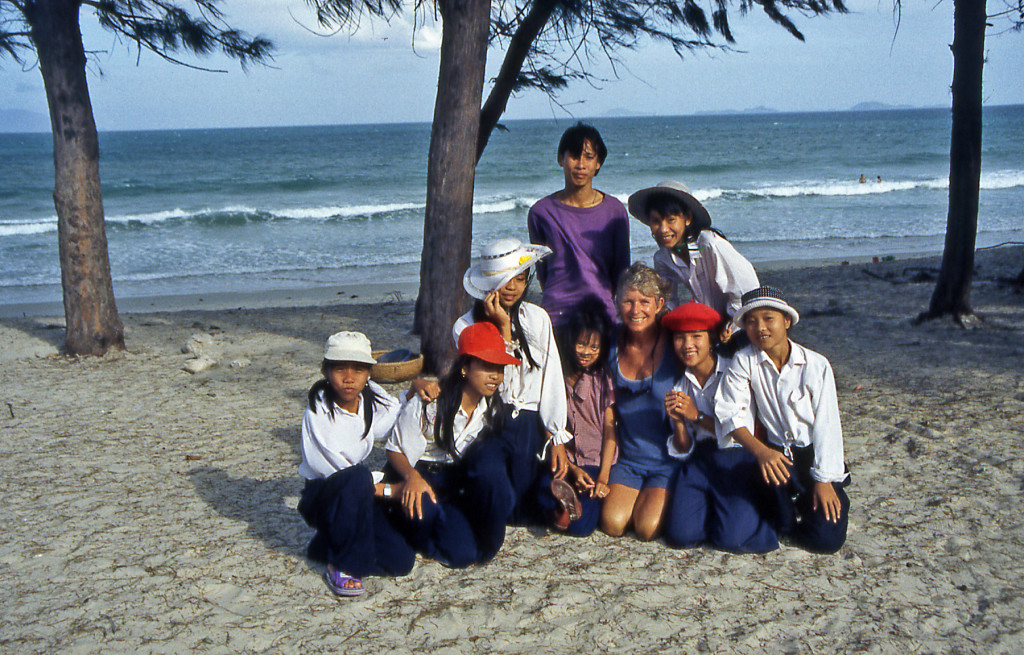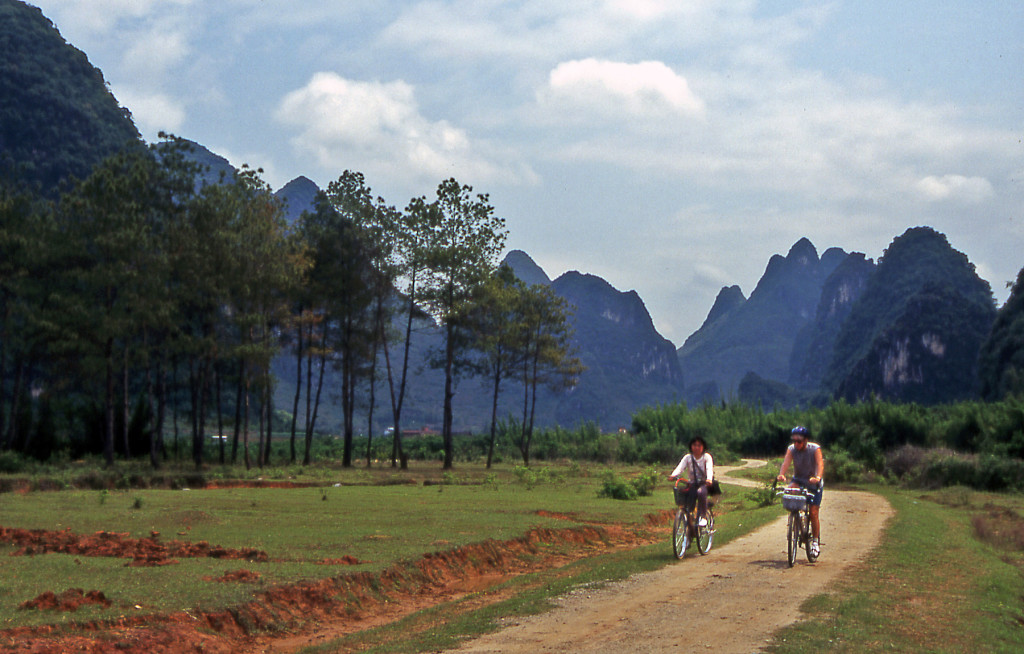Bicycling China
East Meets West
How can we explain bicycling China? We saw such a small part, but came away with firm opinions that did not mesh with other China travelers we know. In the final analysis, we decided that we experienced a completely different China from the one presented to the two week American tourist. First of all, most of our travels were in western and southern China which is a far distant place historically and culturally from the prosperous east coast, areas of antiquities and Beijing. Secondly, we did not travel in a tour; we had no interpreter, no one to be an intermediary. We traveled independently; many people did not know what to do with us. Thirdly, the educated populace who spoke English were not prevalent in the areas where we traveled. And of course, the language is exceedingly difficult for a westerner to get a mouth around.
We also experienced exceptionally cold weather for the month of May which in southern China was supposed to be summer-like. We limited our cycling to local areas due to the unusual heavy rains and took trains or buses to the more distant locations. That presented its own set of problems as you will read in some of the excerpts from our book.
“No English signs warmed a welcome mat. There were no Romanized letters. Chinese script ~ lines across lines across lines tossed in a hodgepodge. Like pick up sticks thrown in the air than settling scrambled and disoriented in a meaningless pile. All black, thick and bold, they dominated the Chinese information highway. I felt like Linus going to summer school without my blanket.”
“We wandered the streets of Hekou in anticipation of a real Chinese dinner and encountered a dizzying array of items we would never have thought to classify as food. Squirmy black worm-like things slithered about in a pan waiting for fate to dip them in batter before frying them alive in hot oil. Shriveled up pig snouts, pig ears, and pig feet with black hooves hung from overhead wires ready for customers’ selection. Live dogs yipped from the confines of bamboo baskets.
“Finally we spotted something that engendered memories of food: roasted ducks. They hung askew by their necks ~ lynched ~ dead white eyes bulging out of their flattened heads, staring down vengefully at passers-by from their lofty vantage point. Behind the ducks, dangling by one captured leg, the other frantically paddling the air, flipped and flopped a pond’s population of frogs. Croak, croak, croak ~ trying desperately to look too small or too tough for acceptance.”
A train from Hekou to Kunming, China introduced us to the heavy air pollution prevalent in so many cities. Depressingly so, there was also much in the country due to factories built in rural areas to enrich the farmer’s economic status. We kept hoping to ride our bikes to the next destination, but before all was said and done, we were in Guan before we got to ride at all, and that was just locally. Riding the trains, however, was a worthy travel experience in it’s own right. In an effort to communicate and decipher the Chinese train system, we were truly On Our Own.
“It took us about an hour to find the train station, another hour to figure out what time the Hekou train left for Kunming. The only signs we could read were the times on the clock. Crowds of Chinese pressed against each of five ticket windows. We picked one and stood our turn in line.
Since I was the language expert, I got to do the talking. I flipped through the phrase book. The questions I needed to ask were not all in the train section. I searched. My conversation would be very piecemeal ~ a word here, a phrase there. I inserted a finger into each page and tried to remind myself of the order by memorizing my fingers: First finger, first ~ then fourth, then pinky ~ no, that’s wrong. I flipped through again reorganizing the order of the key words. OK. First finger, then thumb, then fourth, then pinky.
My turn at the window. Smile! Open to first finger.
Stick the book and your hand through the tiny window and point at the right words, in the right order, at the right moment ~ even if it is upside down for you ~ and the print’s so small ~ how can she possibly read it!”
I can’t speak Chinese. 我不会讲中文。 Wǒ bú huì jiáng zhōngwén.
Do you speak English? 你会说英语吗? Nǐ huì shuō Yīngyǔ ma?
Is there someone here who speaks English? 这里有人会说英语吗? Zhèlĭ yǒu rén hùi shuō Yīngyǔ ma?
Help! (in emergencies)救命! Jiùmìng!
Good morning. 早安。 zǎo ān.
Good evening. 晚上好。 Wǎnshàng hǎo.
Good night. 晚安。 Wǎn’ān.
I don’t understand. 我听不懂。 Wǒ tīng bù dǒng.
Where is the toilet? 厕所在哪里? Cèsuǒ zài nǎli?
Where is the bathroom(polite)? 洗手间在哪里? Xǐshǒujiān zài nǎli?
“What time does”…ha yat baan
“the next”…gei”
“leave/arrive”…dim jung hoi/do a
“bus”…ba si
“ferry”…suen
“train”…foh che
“tram”…din che
“plane”…fei gei
Say “Kunming” and hopes she gets the gist.
“Kunming!”
The lady writes down 13:20 and passes the paper through the window. Efficient, pleasant, successful!
Either she has communicated with a phrase book before or she is just a very perceptive, nice person. I assume that is departure time. I bet she can tell me arrival time.
I point to the Chinese character for “arrival.” She writes down 6:00.
OK. Now we know how long a trip it is. Better ask for a soft sleeper.
Flip to my pinky finger ~ nope ~ that’s the page for “How much does it cost?”
People crowded in against me. A hand reached around my shoulder and shoved money through the window.
Better hurry. Indomitable patience may not be a Chinese attribute after all. Try the fourth finger. Yeah!
This one’s easy.
Yuen ngoh
I raised two fingers hoping she would connect with the concept of two tickets. She pointed to somewhere behind me and to the right.
Oh brother. I bet we have to go to another window.
My eyes connected with her finger and traced the direction.
“Let’s try window number four,” I said to Mike. My adrenaline was pumping about the same level it did when we launched our kayaks on an unknown river. I took a deep breath.
“That’s OK,” he said. “Doing well. Look, there’s nobody in line!”
Second time around gave me the secure feeling of deja vu. With my fingers comfortably in place, “soft sleeper” went through the window hole. I pointed to Mike and myself and raised the trusty old two fingers.
“FGQ MKI T!G%S”
“Huh? What on earth did she say?”
“H^D ERT F#YHB”
“Something else. What do we do now?”
“Maybe she wants us to choose an upper or lower berth like we did in Thailand,” Mike suggested.
“Let’s try that. Which do you want then?”
“I want the upper. I don’t want people climbing all over me to get to bed.”
“Well, let’s get two uppers then. Simpler!”
I flipped through the phrase book until I found upper berth. That seemed to be what she was looking for. She wrote down the price and passed the information through the window.
“Hey, this is working pretty well.” I stood a little taller, buoyed by confidence. “The tellers are really nice. They don’t seem to mind this phrase book talk.”
Mike passed her the money. She began the bureaucratic process of making out the tickets. A thought began tickling at my brain. It came from somewhere in the past experience compartment. Slowly it materialized into Thailand’s trains and the arrangement of their sleeping berths.
“If we both have an upper berth, I wonder where we sit during the daylight hours? Do you think we have to lie in the berth all day?” The teller’s hand came out the window grasping the stamped, stapled, sealed tickets she had laboriously processed. Mike held up his palms in rejection. She caught his message very quick. Her face flashed a don’t-even-think about-it, I’ve-gone-to-all-this-trouble, take-these-tickets and-go-away reply. I stuck the phrase book through the window, my finger securely under our intentions. She took the change of events rather excitedly. She tried to hand Mike the tickets again. Her large round face matched the hot red in the Communist flag behind. He refused. I pointed at the phrase again and pleaded for her understanding. Her eyeballs disappeared into the upper reaches of her head. I thought I would never see them again. Papers flew about the cubicle as she unleashed her frustration then yanked the tickets out of Mike’s hand to start over.
“Hey, that’s right.” Mike’s mind zeroed in on that particular memory and quick started his response. “We have to change the tickets to the lower berth.”
PANIC!
I flipped hastily through the pages looking for “I want to change my ticket to ….”
“Found it!”
“A(T MKIUT LKE NWQI S!R
“I think she’s upset!”
“No matter, We’ve got to make the change”
OK. Stay calm. Don’t let her anger bother you. Put yourself in her position. Imagine trying to deal with these ignorant foreigners! Look at that old Mao uniform she’s wearing. She probably grew up when changing your mind was an automatic date with a firing squad!
I showed her we wanted a lower and an upper berth. She mumbled angrily while the rubber stamp slammed its black authority on our new tickets. A slight additional payment and they were in our hands. Her eyeballs dropped back into view.
“Doh je” (Thank you), I said trying to sweeten the nasty foreign taste we left in her mouth. We succeeded at overcoming the hurdles of the language barrier ~ but the price we all paid dampened any possible celebration.
“What about the bicycles?” Mike said. If the Chinese believed in reincarnation, then Mao rose from the grave and was standing before me screaming the tenets of his little Red Book into my ashen face. Her voice pierced through the glass partition and echoed off the station’s bare walls. A crowd gathered.
“What about …? God! No! We can’t tell her about the bicycles! She’ll have a heart attack! There must be another way.”
We could not think of one. We could not just show up on the sleeper train with two bicycles. We had to arrange for them.
We approached her window ~ my finger glued to the word for bicycle. My hand shook as I placed this tidbit of information before her penetrating glare.
It took a few minutes for the helpful lady from the first window to burst out of her cubicle and run to our rescue. She had obviously deciphered the problem, bicycles, from the echoing reverberations. She spoke a smattering of English. Enough to strike defeat in our hearts.
“Soft sleeper ~ no bicycle.”
“What do you mean? Put bicycle in baggage car. B-a-g-g-a-g-e car,” I reiterated slowly, hoping she understood. I scrambled through the pages of the phrase book and found “luggage.” Her shaking head left no room for mis-interpretation. There was no baggage car on this train. I lowered my forehead to the countertop. Better for thinking.
She tapped on my shoulder. Our helpful lady had her own Chinese-English phrase book. She pointed to, “Please wait a moment.”
Is there really life after death?
Thirty minutes later, she returned. Her halting English was a delight.
“No bicycle soft sleeper ~ Bicycle hard seat.”
Did this mean we could load the bikes in the hard seat compartment? Yes! Only if we rode with them.
GLADLY! HOWEVER, WE’LL HAVE TO CHANGE OUR SOFT SLEEPER TICKETS TO HARD SEAT!
“There is no way I’m going back to that Mao lady. We are not good for her health!”
Our new supporter sensed the level of my apprehension. She led us over to the soft sleeper window. I hid behind her like a child fearing her first teacher. In a soft-spoken, respectful tone of voice, and with eyes properly lowered, she explained the problem to Mao lady and asked for our refund.
Like the wrath of China hurling bombs on Vietnam, Mao lady cut loose. She sucked a roomful of air into her great lungs, raising her buxom bosom up to her chin. Her purpled lips rounded wide open, creating a passageway for her true feelings. Our friend winced from the fury, but maintained perfect Chinese composure. Our money flew out the window.
“Thank you” did not seem to express our thoughts well enough. I looked up another translation.
“Mafan nile” (I have given you so much trouble), I said and clasped our friend’s hand.
“You welcome,” she replied with a wink of her eye.
I had a strong feeling that our China journey was not going to be a case of West meeting the East of our dreams and imagination, but of the East meeting West ~ and figuring out how to cope with us.”
Thus, we established the tenor of our entire trip bicycling China
Trains are the blood cells that flow through the massive body of China and give life to its varied and disparate parts. There are, yet, no super highways to feed or unify this giant. Indeed, if there were, there would be only a nominal number of vehicles concentrated near the major cities with which to speed upon them. Flying across China in an old Russian prop plane is reserved for the rich, the brave and the foolish. No, trains were the peoples’ transportation, and it would be through trains that we would meet the people and their country.
These young ladies spoke excellent English. As part of the younger generation, they were eager to meet us, practice their English skills and discover more about our traditions. For us, they were a warm spot in the cold environment of the more traditional China that we encountered in the south western region of the country.
These younger school children were not yet studying any English at the time of our travels. In 2010, however, China had instigated an ambitious five year program to educate the populace in the internationally accepted English language. Training would begin in Kindergarten. All state employees younger than 40 were required to master at least 1,000 English phrases. What an enormous turn around this represents to the independent traveler to China.
“Though I missed the opportunity to cycle through China ~ as cycling exposed me to a culture like an immigrant struggling to settle in a new country ~ after five months of coping during our sojourn from Bali to Vietnam, I looked forward to the relaxed, comfortable atmosphere of traveling on China’s overnight trains. In the confines of our bedroom cabin, I could isolate myself from further cultural assaults and view the magnificent scenery of China’s southern countryside like a real tourist. In this new role as a destination traveler, whizzing from city to city, I could still discover the China seen and felt by few westerners. For until recently, China’s trains had been off limits to the foreign independent traveler.”
“It was a chilling snow-soaked hour before we found the Kaili businessmen’s hotel. A 24-story statement of ultra-plain, gray ugliness that touted its newness while looking very old. Since its recent birth (easily determined by the architectural style labeled “build it fast and cheap”, it has yet to have its first bath, a change of diapers or a health examination. Though it could count all its fingers and toes, it did not seem prepared to maintain them.
Our arrival caused the kind of stir one associates with mourning ceremonies for the dead. Prompt, enthusiastic or friendly service was unknown here. Phrase book technology won us a room in the same way a student ekes out a “D” on his math examination and runs home to Dad feeling successful.”
The next morning, we stepped outside into the pouring rain that still did not want to let go of its hold on winter. Discouraged again from cycling, we went looking for the local bus to Yongshuo. There we hoped to spend a week. With luck, spring would triumph and we would be able to bicycle around the countryside on day trips.
At least thirty buses, spread out like checkers on a playing board, huffed and puffed their black sooty diesel into the heavy air. The rain beat the particles to the ground, flooding the cobble-stoned square with slick oily grit. Since we could not read the destination signs on the buses, we rambled about the square shouting, “Yongshuo!”
“Yongshuo, Yongshuo!” returned like an echo across the square. We knew we had zeroed in on our quarry when an old lady grabbed my arm and tried to pull me on the bus!
“Let go of me!” I screamed. I could hardly pry her vice like fingers out of my shirt. Then she laughed like a bellows; a strong garlic odor enveloped my face. I pushed her away to a safer, western-style distance and began to negotiate. By now, I had learned a few key phrases.
“Qu Yongshuo, duoshao quian?” (How much is it to Yongshuo?), I asked the old lady.
“Ershi yuen,” she replied while showing the Chinese finger counting system for twenty.
“Tai guile!” (Too expensive!), I responded having studied the phrases for bargaining. “Haobuhao shi yuen?” (How about ten yuen?).
She agreed immediately. It must have been the right price for foreigners. I wondered what the locals paid! Moving along, we next needed to bargain a price for the bicycles.
“Er zixingche?” (Two bicycles?)
She tried for 20 yuen again but the most we had ever paid for the bikes was the cost of a seat. She settled for ten yuen.
With the bikes tied on top, we stuffed ourselves into the bulging mass of round faces squeezed armpit to armpit. A violent jerk threw me against the wall. We were underway. The ticket man squirmed his way through to collect funds.
Mike gave him a 50-yuen note. He gave Mike ten-yuen change.
“Excuse me,” Mike said politely. You own me twenty yuen more.”
The ticket man refused to acknowledge Mike and pushed right on past. Certainly not an action that was destined to win friends. Mike grabbed him by the shirt collar, which brought the two men face to face.
“You owe me twenty yuen more,” Mike repeated.
“DKOEUI MI EURY W WREFD MEOV!”
“I don’t care what you say. We agreed to pay twenty yuen for us and the bikes. You owe me twenty yuen!
The ticket man tried to get away but Mike, reminiscing over the five months of chicanery pulled on us, was not about to let go. Face to face they stood locked in each one’s perception of appropriate behavior.
“Give him his change!” a voice called out from behind Mike. “The tickets cost five yuen each!”
The voice belonged to a Chinese-American woman. Her challenge must have totally stunned the ticket man.
“Wait, wait,” he screamed. “I don’t have any change. I collect from passengers. I come back! I come back!”
With that declaration, and a passenger on his side, Mike released his grip. The collector returned with Mike’s change lickety-split!”
Something difficult for westerners to fathom about China is “guanxi”, traditional values enshrouded in historic and cultural shrines.
“A patrilineal hierarchy of authority and obligations formed a millenia old foundation for familial behavior that spread its powerful influence into all aspects of Chinese society. It was and still is a system that determines authority by sex, seniority, and closeness to the father’s lineage. The system began with the principle of male dominance, which has never been challenged in China’s long history. Even though Meng represented to us a modern, independent, entrepreneurial woman, she was bound by obligations first to her father and next (even before her mother) to her older brother, then younger brother. The greatest debt fell to the eldest son whose obligation it would be to care for his parents as they aged. It would be sheer foolishness to help someone if they could not do you a benefit in return.
With the line of authority un-contested, the next link in the system was obligation. Meng’s parents had made enormous sacrifices to bring her and her sisters and brothers into the world, raise them, feed them, and teach them. As the siblings matured, they became duty bound to repay the debt they had incurred on their parents.
The family unit demands so much attention that there is little time for civic duty or spontaneous generosity. Children are taught not to do anything for anyone else unless it is to repay a debt or to store up good credit for the future by obligating someone else to pay their debt to you.
“Meng became our guide. She had a tour business bicycling around the magnificent Yongshuo countryside with tourists. Her English was excellent, affording us an opportunity to ask questions about China and its people. She took us to her home and made us a traditional lunch. It was the most fun we had in China.”
“Hong Kong, the end of our journey. I remember when we started out in Bali how we replied with bright anticipation and a measure of absurdity to the oft-repeated question that followed us down the road: “Where are you going?” “Hong Kong,” we shouted back chuckling at the extremes of it all, leaving the questioner scratching his head in silent bewilderment. Yet, here we were in Hong Kong. We had completed the very journey about which we so brashly and innocently had bragged.
Now, facing the moment ~ the realization that it was all over and that there would be no new challenging experiences on our immediate horizon ~ set off a flurry of memories.
We were more aware, of ourselves, of others, of different cultures, of philosophies and of histories. We discovered a different view of how we have and have not learned from them. We were exhausted, ready for a vacation, ready to go home, grateful to live in America and anxious to set foot on its lifestyle.”
Copyright Material
All rights reserved. No part of this page may be reproduced or utilized in any form by any means, electronic or mechanical, including downloading, print screen, photocopying, recording, or by any information storage or retrieval system, without the prior written permission by the copyright owner.

